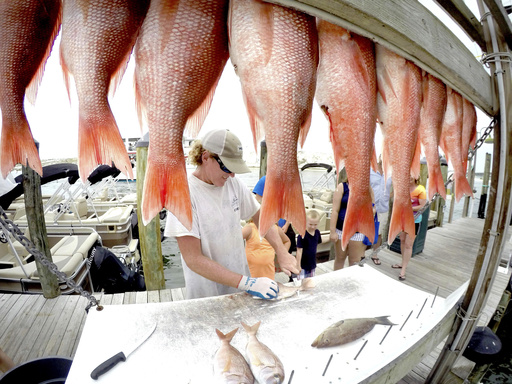
MEXICO CITY — Authorities in the United States, along with fishermen, have been raising concerns about illegal red snapper fishing in the Gulf of Mexico for years. Recent discoveries have clarified the situation, revealing that a Mexican drug cartel is at the center of this lucrative operation.
On Tuesday, the U.S. Treasury Department imposed sanctions on individuals affiliated with the Gulf Cartel, which operates in border towns like Reynosa and Matamoros, adjacent to McAllen and Brownsville, Texas.
The intersection of commercial fishing and drug trafficking may initially appear unexpected, but it aligns with the modus operandi of a criminal organization. The Treasury Department stated that the cartel utilizes fishing vessels to aid in smuggling drugs and migrants, inadvertently catching a significant number of red snapper as they operate. These vessels typically depart from Playa Bagdad, located on the Gulf coast east of Matamoros.
According to the department, “The Gulf Cartel engages in the illicit trade of red snapper and shark species through ‘lancha’ operations based out of Playa Bagdad.” These vessels contribute to illegal, unregulated, or unreported (IUU) fishing practices within U.S. waters and are also employed to transport drugs and migrants into the United States.
In a troubling twist, these Mexican boats often market their catch in border cities, where the fish might be shipped into Texas for resale. This operation takes place as U.S. fishermen are constrained by strict regulations governing fishing seasons and closures designed to sustain fish populations.
“The fishing of red snapper and shark species is under strict limits in the United States, making those species more plentiful in U.S. waters. Consequently, Mexican fishermen venture into U.S. waters using these lanchas,” the department elaborated. “They subsequently return their catch to launcha camps in Mexico, where the products are typically sold and, in many cases, exported into the United States.” The activities of these camps reportedly generate millions each year and also result in the accidental capture of other marine species due to long lines equipped with baited hooks.
This instance is not the first of its kind, as experts indicate that other drug cartels are also engaged in illegal fishing, such as the prohibited gillnet fishing for totoaba in the Gulf of California. This practice poses a significant threat to the critically endangered vaquita marina porpoise.
The sanctions imposed on Tuesday block access to any U.S. assets belonging to identified members, including regional cartel leaders in Playa Bagdad and two fishing camp owners associated with the cartel.
The issue of illegal fishing reached a critical point in 2022, prompting the U.S. government to bar Mexican fishing vessels from docking in Gulf of Mexico ports. This decision stemmed from claims that the Mexican government had inadequately addressed illegal fishing practices in U.S. waters.
According to a 2022 report by the National Oceanic and Atmospheric Administration, “Mexican fishing boats in the Gulf are prohibited from entering U.S. ports, which means they will be denied access to port facilities and services.” Current restrictions, as noted in a recent NOAA bulletin dated September 10, 2024, remain in effect.
Often using illegal long lines or nets, small Mexican fishing boats are known to harvest snapper within U.S. waters, which can negatively impact other marine life, particularly sharks.
NOAA had previously reported that the U.S. Coast Guard has intercepted numerous Mexican boats in the Gulf, including repeat offenders who had been stopped multiple times since 2014. A report indicated that the U.S. imported nearly five tons of fresh and frozen snapper from Mexico in 2018, heightening concerns that some of these imports might have included fish caught illegally in U.S. waters.
